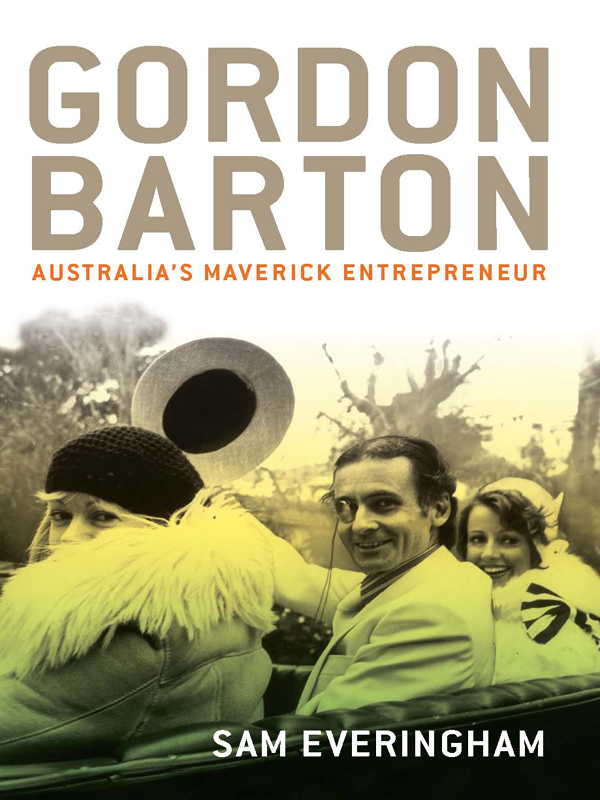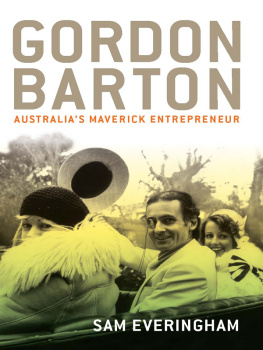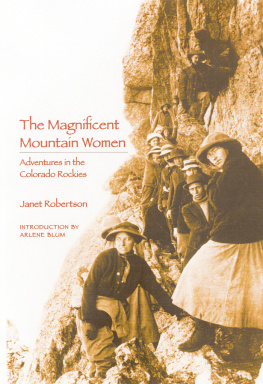
GORDON BARTON
GORDON BARTON
Australias maverick entrepreneur
Sam Everingham

First published in Australia in 2009
Copyright Sam Everingham 2009
All rights reserved. No part of this book may be reproduced or transmitted in any form or by any means, electronic or mechanical, including photocopying, recording or by any information storage and retrieval system, without prior permission in writing from the publisher. The Australian Copyright Act 1968 (the Act) allows a maximum of one chapter or 10 per cent of this book, whichever is the greater, to be photocopied by any educational institution for its educational purposes provided that the educational institution (or body that administers it) has given a remuneration notice to Copyright Agency Limited (CAL) under the Act.
Allen & Unwin
83 Alexander Street
Crows Nest NSW 2065
Australia
Phone: (61 2) 8425 0100
Fax: (61 2) 9906 2218
Email: info@allenandunwin.com
Web: www.allenandunwin.com
National Library of Australia
Cataloguing-in-Publication entry:
Everingham, Sam.
Gordon Barton: Australias maverick entrepreneur/Sam Everingham.
9781741752434 (pbk.)
Includes index.
Bibliography.
Barton, Gordon, 1929
Businessmen Australia Biography.
Australia Party Officials and employees Biography.
338.76092
Typeset in 11/16pt Calson by Midland Typesetters, Maryborough Australia
Printed by Griffin Press
10 9 8 7 6 5 4 3 2 1
To our stirrers and shakers
for thinking outside the square
CONTENTS
It was a rare find for a biographer, to discover an eccentric entrepreneur, a man prepared to repeatedly spend millions standing up for the principles of fair play; one whose battles against the establishment inspired tens of thousands of Australians; a man who had become a part of political and business folklore.
I did not discover Gordon Bartons story until perhaps nine months after his death. Like many Australians, my life was immeasurably and unexpectedly enriched by coming to know him. I came to this story with a background not in journalism (as is so often assumed), but in psychology and research methods. That background has helped not only in digging beneath the publicly known Barton, but in understanding the psychology which drove this complex man.
It quickly became apparent to me that Gordon Bartons life had, in many quarters, gained mythical proportions. The passage of time and Australians love of a good yarn had often blurred the distinction between fact and fiction. To overcome this problem I have turned to letters, diaries and media created at the time or shortly after the events they describe.
Fortunately, Gordon Barton did generate substantial media coverage during the 1960s and 1970s, providing a wealth of verbatim material on which to draw. Where contemporary written accounts of particular events have not survived, I have relied on the first-hand accounts of others who were there. Wherever possible, these have been compared and corroborated with others. In the very rare cases when the details of particular events rely solely on hearsay, this is clearly flagged.
In uncovering the man behind the myth, I interviewed well over one hundred of Bartons friends, colleagues, family members and former lovers, analysed thousands of pages of correspondence, both public and private, press interviews, ASIO files as well as audiovisual archives. Very few people were unwilling to share with me their experiences.
I found myself the custodian of a wealth of material, including extraordinarily intimate details of the mans life. Faced with this plethora of both private and public adventures, the challenge and test lay in what to include and what to omit. There was simply not the space to include everything.
However, to engage you, the reader, in an honest account, I hope I have not flinched from laying bare the idiosyncrasies and weaknesses that made Gordon Barton human.
To me, the political scaremongering justifying Australias commitment to war in foreign nations is no less relevant today than it was 40 years ago when Gordon Barton stood up for commonsense and truth against Australias role in Vietnam. In that sense alone, Gordon Bartons battle against US imperialism, through the Australia Party, deserves recording.
But this is by no means solely a political biography. It is a story of one mans struggle with philosophy, desire, success and power. It is a story of love, of family, of wild adventures and enduring friendships.
When he departed Australia in June 1979, not even Gordon Barton realised that he would never permanently return. Frustrated by a nation that stymied innovation, he would refocus his energies on even greater challenges. Fifty years in Australia saw Gordon create a vision for his country, along with a massive business empire and huge personal wealth. This story shows how in the 1980s Gordon lost his self-control and with it his businesses and fortune. In the 1990s, these losses were painfully escalated as he found himself without his hearing and with his life partner no longer by his side.
Gordon Bartons life, ideas, struggles and achievements are worthy of examination and understanding, for they illuminate not only the failings of those who govern us, but the vision of those who can see further ahead than most and have the ability to act on that vision.
CHAPTER ONE
LOSS AND UNCERTAINTY
A mans mind is the most valuable thing he possesses next to his soul.
Gordon Barton, aged seventeen
It was close to three in the morning as the beam of the Water Police launch searchlight fixed upon a lone figure in impeccable flannels and yachting jacket striding out confidently onto the private Double Bay jetty. The unruffled millionaire wanted to thank the authorities for rescuing his shipwrecked friends from a nearby Sydney Harbour island.
As the boat bumped against the jetty, it began to disgorge a rather unlikely party. A nervous transvestite in a brief leather skirt and bright red peasant blouse prepared to leap to safety. Tipsy and with his arms chained behind his back, he came close to toppling over as his high-heeled black pumps landed on the rough wooden planks. A blond, muscled German in a skimpy Roman gladiator outfitsomewhat drunker than his manacled companionwas next to alight. Even more distracting to the three police sergeants was a beautiful, bare-footed woman in a bedraggled leopard-skin jumpsuit.
It was fortunate the Water Police had not discovered the shipwrecked party earlier. Only two hours prior, one of the most respected men in corporate and political Australia had been chained on that same island in medieval armourhis wrists and ankles secured by manacles. His timely escape, paddling a one-oared dingy through the night to the safety of the mainland, would have made great copy for the morning papers.
Even six months out from his fiftieth birthday, Gordon Barton still enjoyed the thrill of living dangerously.
It was an ancient city. Founded at the end of the thirteenth century, the city of Surabaya on the long, densely populated island of Java had been in Dutch control since 1746. Sugar had been the ports staple export crop for a century before Gordon Barton was born there. At the end of the nineteenth century it was the busiest port in the Dutch East Indies. The Australian trading conglomerate and shipping firm Burns Philp sourced much of its trade cargo from the region. By the time the Great War was bleeding Europe in 1914, Burns Philp had ten outposts scattered around the South Pacific, including one in Surabaya.
Next page













